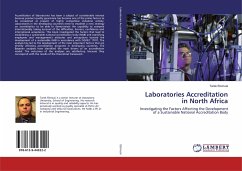
Laboratories Accreditation in North Africa
Investigating the Factors Affecting the Development of a Sustainable National Accreditation Body
Versandkostenfrei!
Versandfertig in 6-10 Tagen
51,99 €
inkl. MwSt.

PAYBACK Punkte
26 °P sammeln!
Accreditation of laboratories has been a subject of considerable interest because product quality guarantee has become one of the prime factors to be considered at present of highly competitive industrial activity. Laboratories in the developing countries need to establish a new strategy on accreditation to be able to demonstrate the capability to compete internationally, taking account of the difficulties, barriers, confidence and international acceptance. This book investigated the factors that lead to establishing a sustainable national accreditation body (NAB) and examining employees and m...
Accreditation of laboratories has been a subject of considerable interest because product quality guarantee has become one of the prime factors to be considered at present of highly competitive industrial activity. Laboratories in the developing countries need to establish a new strategy on accreditation to be able to demonstrate the capability to compete internationally, taking account of the difficulties, barriers, confidence and international acceptance. This book investigated the factors that lead to establishing a sustainable national accreditation body (NAB) and examining employees and management's attitudes and perceptions toward the development of a sustainable NAB in accordance with ISO/IEC 17011. The analysis has led to the development of the main important factors that are directly affecting accreditation programs in developing countries. The Bayesian analyses have identified the main drivers of an accreditation model. The outcomes of the analyses are satisfactory, because they correspond with the results of the theoretical framework.












